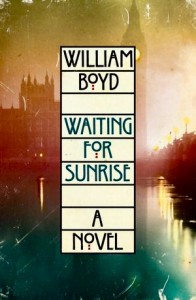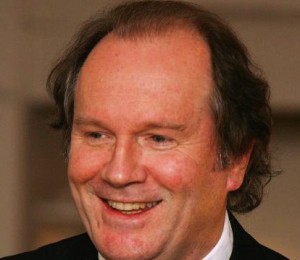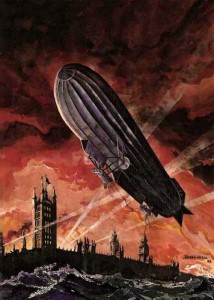“Great acting is being able to say ‘Pass the salt, please,’ without sounding weird or odd or stupid or portentous. Great acting is being able to say ‘Horror! Horror! Horror!’ without sounding weird or odd or stupid or portentous.”
 Lysander Rief, the actor-son of famed Shakespearean actor Halifax Rief, is in Vienna, as the novel opens in August, 1913, seeking treatment for an embarrassing sexual problem. A close friend has suggested psychoanalysis, and Lysander has gone there for treatment. His doctor, a believer in “the fabulating function” of Bergson, not the methods of Freud, has told him that “If the everyday world, everyday reality, is a fiction we create, then the same can be said of our past – the past is an aggregate of fictive realties we have already experienced – our memories.” His goal is nothing less than to help Lysander change his damaging “old fictions” into a unique blend – “a union, a fusing – of this individual imagination and reality.” What is real versus what merely seems real is obviously the primary theme here as Lysander deals with his problem, even as Europe deals with its problems and past histories in the lead-up to World War I. Additional themes of love and sex, and life and death as they overlap with the ideas of reality and fantasy enhance the main theme and bring it to life in new ways.
Lysander Rief, the actor-son of famed Shakespearean actor Halifax Rief, is in Vienna, as the novel opens in August, 1913, seeking treatment for an embarrassing sexual problem. A close friend has suggested psychoanalysis, and Lysander has gone there for treatment. His doctor, a believer in “the fabulating function” of Bergson, not the methods of Freud, has told him that “If the everyday world, everyday reality, is a fiction we create, then the same can be said of our past – the past is an aggregate of fictive realties we have already experienced – our memories.” His goal is nothing less than to help Lysander change his damaging “old fictions” into a unique blend – “a union, a fusing – of this individual imagination and reality.” What is real versus what merely seems real is obviously the primary theme here as Lysander deals with his problem, even as Europe deals with its problems and past histories in the lead-up to World War I. Additional themes of love and sex, and life and death as they overlap with the ideas of reality and fantasy enhance the main theme and bring it to life in new ways.

However well drawn the themes may be (and the fiction vs. reality theme is extremely well done), the novel is memorable primarily for its good story, a trademark of author William Boyd throughout his long career. Vienna is bursting with activity as Lysander meets men and women from the British consulate and military, the Viennese world of art and the theatre, the psychiatric world inspired by Freud and others, and the servant world at the Pension Kriwanek, where he lives, and he feels “strangely at home” in Vienna. Some of the tensions endemic to the period surface, however, when a Slovene cavalry officer at the pension faces a criminal tribunal, only, he says, because he is Slovene, and when anti-Semitic remarks appear in conversation. Lysander, concerned primarily with solving his sexual problems, however, is too pre-occupied to spend much time thinking about the political stresses which will end in war just one year later.

Lysander’s uncle Hamo has just purchased a Turner Two-Seater with collapsible hood
Providing plenty of well-developed background for his main characters, Boyd also leaves mysteries in their lives, developing these mysteries to add complexity to his plot as the novel progresses. Lysander’s whole wealthy family becomes part of the story here—his parents, his step-family, his uncle—as does Blanche, his fiancée in London – all of them staid and steeped in the traditions of their social class, it appears. In Vienna, away from his roots, Lysander sees new opportunities. Hettie Bull, a femme fatale, succeeds in persuading him to pose nude (wearing only a “cache-sexe”) for a sculpture she is working on. She disregards all the societal norms, poses nude for a poster which horrifies Vienna, sleeps with anyone who appeals to her, lives most of the time with a man to whom she is not married, and uses cocaine, but even Hettie has her secrets and plots. Consular officials and British military attaches are involved in spying, and half the city seems to survive by blackmailing the other half and then, in turn, being blackmailed by them. Nothing and no one are what or who they seem to be.

Winchelsea, where Lysander visited his uncle upon his return from Vienna
When war breaks out, Lysander enlists and faces skirmishes in France, at one point losing his bearings on the battlefield (his memory proves false), but he soon finds himself drafted for a new kind of task. As an actor, he has spent his professional life bringing other characters to life, and when Britain suspects that there is a “mole” in the British high command, conveying key information to the enemy, they assign Lysander to figure out who that might be, giving him a false identity and putting him to work as a spy. He quickly discovers that his work in Shakespeare’s Measure for Measure, which is set in Vienna and deals with issues of purity vs. lechery, and moral corruption vs. moral triumph, has provided little insight into the task he is expected to perform now, not just to save the country but to save himself as he plays the most important role of his life.

Zeppelin over London, 1915. Lysander found them “mesmerizing” before the bombs fell.
The British have intercepted coded messages which consist of a string of numbers, and they suspect that this is a one-to-one code, limited to only two individuals who use the same edition of a specific book as the key. Lysander must identify the book and who among the British high command, perhaps someone in the War Office, is responsible, a phantom referred to as “Andromeda” by investigators. Lysander’s mysterious liaison named “Bonfire,” the reappearance of Hettie Bull, a wide variety of characters who are not who they are thought to be, and even an opera from 1912 combine with secret messages, torture, shootings, and betrayals to add depth and excitement in the last part of the novel, taking the theme of reality vs. pretense to its ultimate conclusion. As one character says:
“Maybe this is what life is like – we try to see clearly but what we see is never clear and is never going to be. The more we strive the murkier it becomes. All we are left with are approximations, nuances, multitudes of plausible explanations. Take your pick.”
NOTE: This theme is clearly one that Boyd enjoys exploring, and he obviously had great fun in 1998 when he was responsible for a HOAX which occurred when he published NAT TATE: AN AMERICAN ARTIST, the “biography” of abstract expressionist “Nat Tate,” who “died” at age thirty-one and whose collection of paintings from the 1950s is included in the book.
ALSO by William Boyd: ANY HUMAN HEART, NAT TATE: AN AMERICAN ARTIST, SWEET CARESS, RESTLESS (link to Amazon review), LOVE IS BLIND, TRIO
Photos, in order: The author’s photo appears on http://www.news.com.au
Lysander’s uncle Hamo has just purchased a Turner Two-Seater with collapsible hood, shown here: http://www.localhistory.scit.wlv.ac.uk
When Lysander comes back from his first trip to Vienna, he pays an enlightening (and thematically revealing) visit to his uncle in Winchelsea, on the cliffs, shown here: http://www.tripadvisor.co.uk
In 1915, the Germans sent a Zeppelin over London, where it bombed the theatre district. Lysander found it mesmerizing to watch and seemingly “serene” before the bombs fell: from http://www.dieselpunks.org
